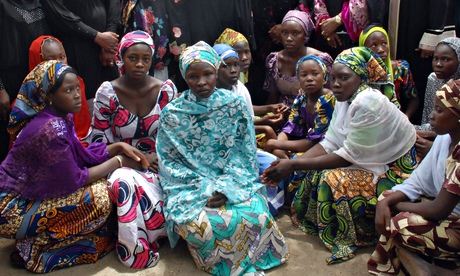Three years after more than 200 Nigerian schoolgirls were kidnapped from their dormitory by the terrorist group Boko Haram, another sinister threat to the region’s children is growing dramatically: they are being made to kill themselves and others with bombs.
A total of 27 children have died so far this year after detonating bombs strapped to their bodies that they were ordered to carry into markets, checkpoints and other public places. The number is almost the same as the total who died over the whole of last year, according to a new report by Unicef.
Most of the time, girls are used for these attacks, though girls and boys walking alone – even very young ones – are now regarded with suspicion. Those who have had any contact with Boko Haram often keep quiet about it for fear of how their communities will treat them.
Other attacks have been carried out by women with babies strapped to their backs as decoys.
“These children are victims, not perpetrators,” said Unicef’s Marie-Pierre Poirier. “Forcing or deceiving them into committing such horrific acts is reprehensible.”
The whereabouts of most of the 276 Chibok girls, who rose to international fame after a campaign using the hashtag #BringBackOurGirls was endorsed by Michelle Obama, remain unknown. But they make up just a fraction of the thousands of children that the group has abducted.
All week, the main activist group that has campaigned for the Chibok girls’ release has been holding events in the capital, Abuja, to mark the third anniversary of their abduction. The group has petitioned the government to do more to bring them home, whether by negotiating with Boko Haram or by rescuing them by force.
“We took a vow in April 2014 that we’ll not stop until our girls are back and alive,” said Fatima Abba-Kaka, an activist attending the marches, cultural events and an inaugural lecture by the Emir of Kano, one of the two most important Muslim leaders in Nigeria.
Abba-Kaka felt sustained protesting was necessary to keep the girls in the public consciousness. “It’s Nigeria. If not they would have forgotten the Chibok girls. I’m a mother, I have a daughter – it can be anybody’s child,” she said.
Red ribbons tied to trees marked the path protestors took through Abuja to Aso Rock Villa, the seat of the presidency.
The Nigerian president, Muhammadu Buhari, came to power in 2015 after promising that his government would release the girls, who have been paraded in several Boko Haram videos posted online since their kidnap.
After he was elected, though, he said that much as he wanted to, it may not be possible to find them. Last year 21 of them were released after negotiations brokered by the Swiss government and the International Red Cross. Roughly 190 remain in captivity.
Initially, Abubakar Shekau, Boko Haram’s leader at the time, vowed to “sell them in the market”, saying he knew a slave market to which he could take them. But reports since then suggest the militants have held on to most of the girls after realising how valuable their high profile made them.
According to Amnesty International, there has been no let up in abductions in the Lake Chad region.
“Boko Haram continues to abduct women, girls and young men who are often then subjected to horrific abuses, including rape, beatings and being forced into suicide bombing missions,” said Makmid Kamara, Amnesty International’s interim country director for Nigeria.
“These appalling abductions and other attacks, some of which constitute war crimes and crimes against humanity, are carried out by Boko Haram on an almost daily basis. They must stop.”
Hauwa Sadiq’s sister, Rosemary Daniel, is among the Chibok girls still missing.
The night Rosemary was abducted three years ago feels like yesterday, said Sadiq, who described how she had travelled to Borno to pick up her 17-year-old sister after her final exams and take her back to her home in Abuja, to help her look for work. The night Sadiq arrived, Rosemary was abducted. Apart from when she spotted her wearing a hijab in an early video released by Boko Haram, Sadiq has heard and seen nothing of her.
“They can do anything they like with them – they can hurt them, they can beat them,” she said, nursing her nine-month-old son Mohammed, the cheeky nephew whom Rosemary has yet to meet.
Sadiq’s family has suffered greatly during Boko Haram’s reign of terror. Her father was killed by militants in 2009, she said, and her village was burned to the ground last week.
She said she did not think her sister would be made to kill herself by detonating a bomb, as people said it was subsistence farmers’ children, not schoolgirls, who were generally used.
“I still have hope. Others have come back. She too will come back,” she said.











